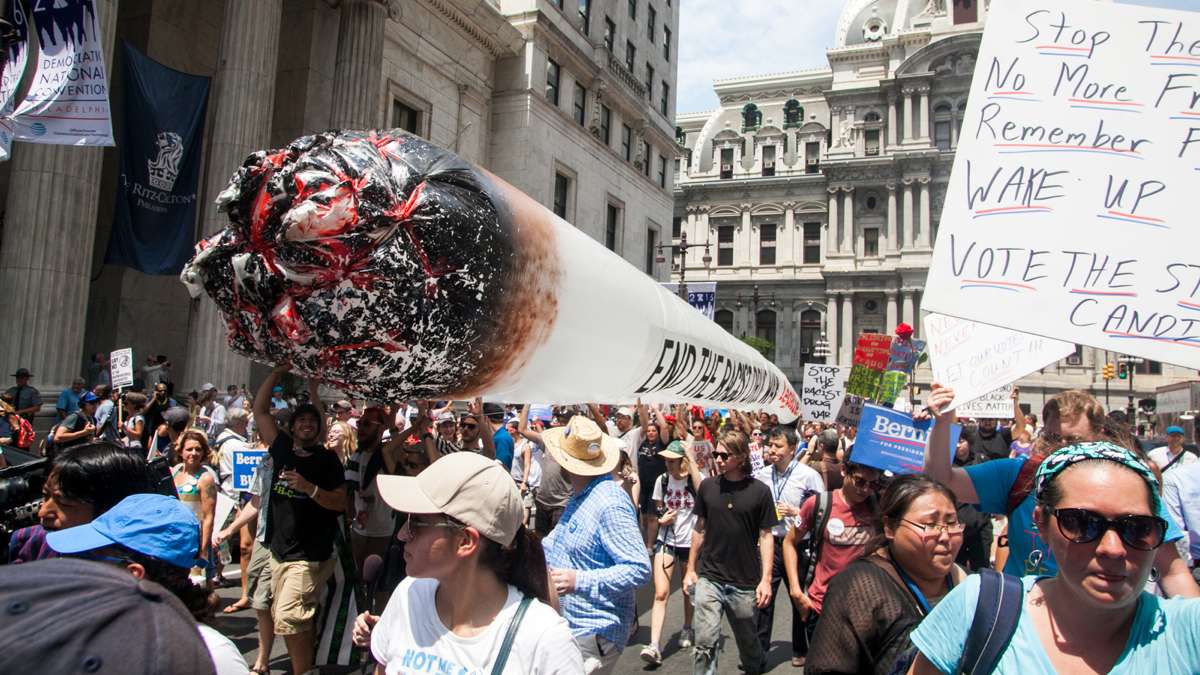Philly’s 3-year-old pot possession law: Many are fined, few are paying
Since 2014, police have handed out 6,940 citations for possession — which garners a $25 fine — and public use. That translates to $312,525 owed to the city.
Listen 2:44
Marijuana legalization demonstrators carry a 50 foot inflatable joint down South Broad Street mingling with Bernie Sanders supporters on their way to FDR Park during the Democratic National Convention in 2016. (Brad Larrison for WHYY)
Chris Goldstein wasn’t surprised to see cops waiting for him. In fact, he was expecting them.
In January, to protest a short-lived ban on sitting on a series of walls inside Philadelphia’s Rittenhouse Square, Goldstein and a group of pot activists organized a public smoking session, an activity in the park that nearby neighbors were trying to snuff out.
They called it “Toke Back the Wall.”
“The major crimes unit showed up with a van, and 200 uniformed officers filed into the park, and we lit our joints,” Goldstein said. “We were escorted to the van and written a ticket.”
Nearly a year later, he has yet to pay the $100 fine, issued under the city’s 3-year-old decriminalization law.
He’s not alone.
Since 2014, police have handed out 6,940 citations for possession — which garners a $25 fine — and public use. That translates to $312,525 owed to the city.
But to date, only $64,736 of that total — a hair above 20 percent — has landed in the city’s general fund, which helps plug holes in department budgets and cover pensions and other financial obligations.
“I don’t think anybody views marijuana-possession citations as a big boon to the city from a financial perspective,” said Deputy Mayor Jim Engler, who helped write the decriminalization law introduced by another Jim, then-Councilman-now-Mayor Jim Kenney.
“Not impacting [offenders’] ability to get a job or go back to school is really the benefit of the ordinance for this minimal activity,” Engler said.
A structure that fits the offense
Reading between the lines, having a small stash of pot appears, unofficially, to be legal in Philadelphia.
But Engler disputed that assessment.
“It’s specifically laid out in the law and the Philadelphia code as being against the law to have in your possession. We wanted to create a structure that we thought really fit the offense,” said Engler.
The law makes possessing or smoking marijuana similar to a summary offense. Offenders can’t be penalized for not paying up – the city can’t add to what’s owed. They also can’t be taken to civil court over an unpaid fine.
The result: Not paying a parking ticket in Philadelphia could cost more than a marijuana citation.
A mayoral spokesman said the city does make an effort to collect when it can. For example, if someone has other outstanding fines for things such as putting the garbage out too early, having an overflowing dumpster or high weeds, a marijuana fine could be folded into their debt.
To Goldstein, the pot activist, that’s just fine.
“We do want some kind of deterrent out there that police and other members of the community can use if they encounter cannabis consumers who are not acting like good custodians in their community,” said Goldstein.
A bill for legalizing marijuana in Pennsylvania has been introduced in Harrisburg, but it has been sitting in committee since the beginning of the year.
State legislation is one of the only ways to legalize the drug and potentially send Philadelphia’s decriminalization law up in smoke.
WHYY is your source for fact-based, in-depth journalism and information. As a nonprofit organization, we rely on financial support from readers like you. Please give today.




